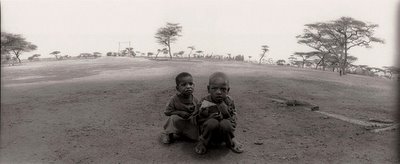It is perfectly human to express fury at those who defile you and your beliefs. The marketplace of ideas invites vitriol and that’s precisely what the 2005 Ethiopian elections produced. Unlike individuals, however, a government’s response to criticism and insult must be tamed and reflective—it must be conducted within a set of transparent rules designed to factually refute the criticism while taking great care to protect the very right to criticize and insult. We must state the obvious: a citizenry’s belief that it is free to express its disagreement with its rulers is a central and most fundamental aspect of a democracy.
A prime minister’s gratuitous speech that “democracy goes on unperturbed” is not what convinces the governed that democracy has finally arrived at their nation’s doorsteps. Nor are the random acts of parliamentary opposition to majority rule and equally random ruler tolerance of it sufficient to quench a people’s thirst for intellectual liberty.
Democracy does not require brilliant leaders to help usher hope to a battle-weary conflict-ridden society. It needs the likes of George Washington and Nelson Mandela who teach the governed that relinquishing power is an eternal gift to their people.
Democracy will not arrive in a nation via Troika-led diplomatic maneuvers. The exchanges of learned “friends of Ethiopia” including Donald Levine, Christopher Clapham, Herman Cohen, and Paul Henze, while educational, won’t do it for us either. Its sacred promises will not be delivered by powerful American lobbyists or lawyers. Nor will its secrets be unlocked by way of insults posted on a government website and in chat forums.
Notwithstanding Carpe Diem Ethiopia’s previous disagreements with the EPRDF for scoffing at Ethiopia’s history and flag, democracy, really, has nothing to do with the green, yellow, and red—whether adorned with a scepter-bearing lion or an ominous blue star. They can scorch both of them at a Demera bonfire. The desecration of national, historic, and religious symbols, however, is as pitiful as our irrational responses to those acts.
Democracy is not just about casting ballots. Nor does it merely take the drafting of a constitution and creation of institutions in which democracy can flourish.Constitutional protections are important but are not determinative. The British never bothered to write a constitution. The US’ guarantees of freedom and liberty are so broad that the notion of individual freedom is rewritten almost every decade in response to evolving domestic and international realities. On September 10, 2001, even the most ardent American right-winger could not have predicted the sweeping passage of a Patriot Act.
When we claim to be ruled under a constitution, the safeguards penned by its framers cannot be guaranteed by the governed. That responsibility falls squarely on rulers. A constitution must restrain rulers who have not only consented to become servants of their own written laws but also educators on the judicious exercise of power. The rulers serve under those laws, not over them. And they must rule by example. If they breach protections, they teach the governed to defy laws; if rulers engage in acts of fraud, they teach the governed to defraud; if they kill, the governed learn to murder. Affirmations of the existence of the “due process of law” and “rule of law” are only as good as the deeds and actions of those in charge of protecting these fundamental rights. We should state yet another palpable fact: the very reason for constitutions and their lofty promises is ultimately to restrain the monstrous powers of governments.
At its core, democracy is a simple proposition: it's about hope. It is a phenomenon that unravels during the most critical moments in a nation’s history when folks, through their own volition, get together and commit to leave a better society for their children. Democracy is a lightening rod of reason that strikes the hearts of the wisest to make a solemn compact to provide hope for the governed on whose behalf they supposedly speak.

The promise of democracy takes the momentary suspension of reality borne out hundreds of years of conflict and suspicion so pervasive in our culture. The governed don’t ask much. They need to be convinced that those who claim to lead them will make a collective decision: that human life is sacred—that despite the humble circumstances from which we could be born, each member of the governed matter. The Locke/Jefferson formulation chills the napes of the writers at Carpe Diem Ethiopia: that certain truths are self-evident; that all men are created equal, that they are endowed by their Creator with certain inalienable rights, that among these are life, liberty and the pursuit of happiness.
Democracy is the promise of a social order that teaches its children that being an Amhara is not synonymous with colonialism or an Oromo just a victim of it; that we are all more than what our non-optional DNA makeup makes us. It’s about Ethiopia looking at herself in the mirror and asking who am I, where was I, and where am I going? And it’s about the reflection saying you will go as far as your collective hopes and aspirations. Just find what they are. And seize the day by its horns.
Photograph courtesy of David Blumenfeld (c)David Blumenfeld/www.blumenfeld.com, who may be contacted at david@blumenfeld.com. Check his site for powerful photography on Ethiopia and the Middle East.

